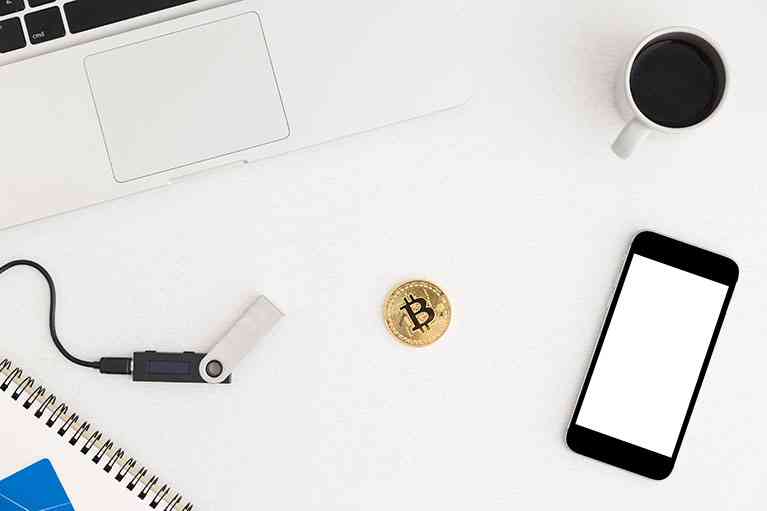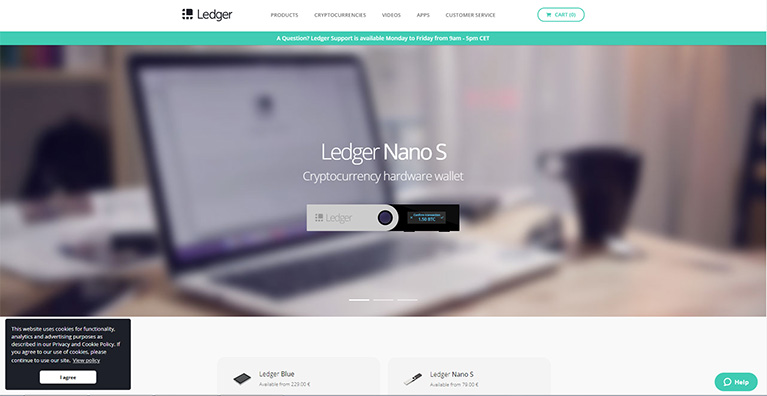What Is A Digital Wallet?
A digital wallet (or e-wallet) is a virtual storage of someone’s payment and identification information for various payment systems. Digital wallet allows people to streamline purchase process on dedicated services and can also be used together with mobile payment systems. A recent example is Apple Pay on the iPhone.

Crypto wallets are unlike the regular e-wallets. There are differences between the different types so we investigate the options available.
How do Cryptocurrency Wallets work?
This is where we start to lose a grip on reality. Literally, there are no physical coins.
What’s in the wallet is the private key, a line of code which holds the information of what you have bought.
- Only your private and public keys are stored and synced with the blockchain
- Public and private keys must match for the transaction to be successful
Then, receive a public key that you use to exchange cryptocurrency. To give an analogy; it’s like an email account. The email address is the public key that you give to everyone, your password is the private key. The one difference is while anyone can send an email to your address, it is only you who can access the details of the sent emails.
To summarise:
Different Types of Crypto Wallets
There are two main types of cryptocurrency wallets – Online/hot/soft and offline/cold/hard but these can be subdivided into:
- 1. Desktop Cryptocurrency wallet
Desktop crypto wallets are downloaded software from a coin’s official site and install it on your laptop/desktop. The only threat to your coins in such a wallet is if someone takes control of your computer physically, or your software gets attacked by a hack or virus.
Advantages
- You have full control of your private keys
- Easy to use
- You can have various backups for security
Disadvantages
- If you lose your hardware, you could lose the currency
- Could be affected by malware or viruses as its exposed when connected to the internet
- You only have access to your coins when you have your computer
2. Online Cryptocurrency Wallet
Online wallets are convenient as they are typically apps and for most, allow access to your coins anywhere at any time. One issue is the control. The platform can close down with all your coins. As you wouldn’t take your whole bank accounts value with you in your wallet now, you shouldn’t have all coins or tokens with you in one place.
Advantages
- You can access your coins anywhere for transactions subject to an internet connection
- Easy to set up
- Most exchanges are very secure with their two-factor authentication
Disadvantages
- Hackers will always be a credible threat
- If an exchange collapses or is hacked, you are likely to lose all your coins
3. Mobile Cryptocurrency Wallets
A mobile wallet is a cryptocurrency wallet purely in/on your smartphone. You need to download a specific software or application from the official site of the coin you want to store. Most have one to compliment there online offering.
Advantages
- You can use your coins anywhere as long as you have your phone
- Comes with additional security features like QR code scanning
Disadvantages
- Your phone is always vulnerable to malware and viruses
- If you lose your phone and haven’t backed up your security features, you lose your cryptocurrency
4. Hardware Cryptocurrency wallet
Hardware wallets are incredibly safe and the best. They aren’t connected to the internet, hackers cannot have access to your coins. Some of these wallet’s cryptos are so advanced that you can transfer and receive coins without having to connect to the internet. Even some sophisticated wallets have digital displays, not even requiring you to connect them to a computer.
Advantages
- Very secure as they are not connected to the internet
- You can receive coins in some without having to use a computer
- Ideal for storing large amounts of digital currency without the risk
- Have a backup security in form of a USB
Disadvantages
- You have to have them physically to use your coins
- Complex for beginners
- Expensive at over $100
5. Paper Cryptocurrency wallets
Its old school, something your gran would do and prefer. You generate a code that you print onto papers and keep them safe. These papers have both your private and public keys. You can simply swipe the codes or copy them manually when you want to transact. Ironically, the safest and most secure – and cheapest.
Advantages
- Secure and not prone to hackers
- Very easy to generate
- Cheap
Disadvantages
- The papers can be stolen
- If something happens to the paper users may lose all their coins
How Safe are Cryptocurrency Wallets?
Cryptocurrency wallets security does depend on the type of wallet and the user.
As a rule, the more easy and convenient to use, the more vulnerable to hacking attacks.
Offline wallets like hardware and paper wallets are very secure because as mentioned they are never connected to the internet.
If you want to add a layer of security to your digital coins, here is what you need to do;
- Add an encryption code. This is a master code that secures the private keys. A hacker has to bypass or crack this code to access your coins in your wallet. Check if your wallet has a two-factor authentication (2FA). This is an added security feature that requires you to use your phone to receive codes for verification. PIN codes are also important as they add a layer of security – don’t use your bank code!
- Backup your wallet be it a cold or hot storage. Ensure that you write the 12-word backup phrase and keep it in a safe place. In the case where you lose your password, or your device is compromised, you can always access your wallet and secure it using your backup option.
- Keep the software in your wallet updated. Updating your wallet increases your security level as technology changes rapidly this day. Yes, it’s annoying to change but it might be easily hacked as it may have the same bugs or present loopholes to hackers.
Cryptocurrency Wallet Fees And Costs
Digital coin wallets have no fixed fee. If you are using an online wallet linked to an exchange, you might be required to pay commission for that particular service. Some exchanges charge when you transfer coins from their platform to a different wallet as a “deposit” or “withdrawal” fee.
For any transaction to take place on the blockchain, the peers on the network have to be incentivized for them to add a transaction on the blockchain. These are the rewards that the miners get. Wallets have to be confirmed by the network of the particular digital coin. This applies to both personal wallets as well as those held or those connected to an exchange. The charges, in this case, will depend on that particular network. Keep it simple and mainstream, most are free.
Are Cryptocurrency Wallets Anonymous?
Most wallets are stored publicly on the blockchain. A few wallets like Jaxx, Samourai, and Multibit are partially anonymous. Users are never asked for their email addresses or any other personal information.
Despite these wallets’ attempt to keep you anonymous, you still have to transact. All transactions are recorded on a public ledger and can be traced back to the source, albeit after bypassing some security measures.
Though it is still difficult to obtain complete anonymity, developers are working hard to ensure its possibility.
Investing and Crypto wallets
Investing successfully in Bitcoin and other cryptos can seem daunting, but it is much easier when you break it down into steps. Buying Cryptocurrency is getting simpler by the day and the legitimacy of the exchanges and digital wallets is improving as well.
How to Invest Using a Crypto Wallet?
- To create an account on the website, choose the “Sign UP” tab. Enter your email address, password, first and last name, and the residing country. If you already have an account, you can directly sign in.
- You have to verify your account by providing details such as passport, national ID, and documents for verification.
- Once you are verified, you can gain access to your wallet, following which, you can buy, sell or trade your cryptocurrencies.
Spotting the Safest Crypto Wallets
To spot the safest crypto wallets, you have to understand the strength and weaknesses of your wallet. Coinbase and Leger dominate the crypto market as they have a strong and sustainable foundation.
- If you are using the crypto wallet for business purposes, the wallet will have several owners. Make use of the multiple-key facilities so that it is not possible to transfer the funds to another wallet in secret. This facility will prevent fraudulent access to the wallet.
- Ensure that your crypto wallet has a backup option. When your device does not function, you can retrieve your data using the backup option.
- Have a good password that is not easy to decipher. Keep your antivirus updated with anti-malware tools. Keep your wallet updated and connect to secure sites.
Trading Platform or Digital Wallet- Which is Best?
Trading platforms and digital wallets are two tools in the digital industry. Most companies manage both wallets and exchanges.
- Trading Platform: You can buy and sell your crypto and send your crypto to your wallet. You trade from one coin to another on the exchange.
- Digital Wallet: A wallet safeguards your digital asset. It is a software program that stores your private and public keys. You can store your tokens for the long term and access them at any time.
You can store your crypto in exchange for the short term and trade them. But, it is best to transfer funds to a wallet where the tokens are completely under your control, and you manage your funds with a backup.
List of Cryptocurrency Wallets
Top cryptocurrency wallets provide a digital solution to store and manage your digital assets securely. Some wallets support a single cryptocurrency, while some can hold multiple cryptocurrencies. They can be accessed through passwords and offer high security.
- Coinbase Wallet
- BitGo Cryptocurrency Wallet
- Exodus
- Jaxx
- Bitcoin Core Client
- Trezor Wallet
- CoinPayment Wallet
- Mycelium Wallet
- Copay
- Ledger Nano 5
Securing your Investments with the Best Crypto Wallets
Getting started with different cryptocurrency variants means finding a wallet capable of holding your currencies that is ideally both easy to use and secure. While there are different wallet ideologies to consider between online and offline storage, most every wallet has a smattering up upsides and downsides that can make them more or less appealing to different types of crypto users. It’s important to know your options accordingly.
If you’re not sure what type of wallet is ideal for you, consider brushing up on some crypto wallet basics to help you nail down exactly what you need from your wallets-to-be. Since not every wallet fits every need, we’ve gathered up a few of the best wallets with online, offline and even physical solutions to ensure there’s something here for everyone.
1. BitCoin Core
For those with a laser-focus on BitCoin, BitCoin Core is a solid choice if you can manage the barriers of entry that are mildly daunting from the outset. For starters, BCC s a full-node client, which means upon the first launch it will download the latest version of the BitCoin blockchain in its entirety, which is slowly approaching 200GB in size. You’ll have to ensure you have a solid internet connection with a fair amount of bandwidth to keep up with updates, as well as a large enough hard drive to house the blockchain data.
On the upside, this approach to security makes it much harder to force illegitimate transfers with crypto that has already been spent and it comes pre-configured to use the Tor network, which makes it difficult for unauthorised users to find your home IP address, which helps keep you anonymous.
2. Ledger Nano S
If you’d rather take a hands-on approach to your crypto security, the Ledger Nano S is a fairly new entry in hardware wallets with an impressive spec list. Created by a French startup, this wallet comes in a USB-style configuration that is powered via USB and handles a small handful of currencies including BitCoin, Ethereum and LiteCoin.
Physical wallets of this kind are perfect for those concerned with safety and ensuring their transactions are valid, as the device comes with physical buttons on its side to confirm transactions with. Access to your wallet is guarded by a PIN code and should you lose your physical stick, you can create a 24-word recovery phrase to access a backup of your wallet and retrieve your currency from anywhere.
3. Exodus
Created as an online wallet designed to handle multiple currencies without going to a full open-source implementation, Exodus has middle-of-the-road features for many average users without giving up their peace of mind or their ability to access multiple currencies. For starters, Exodus has standard retrieval phrase and password options, but it doesn’t require you to download the entirety of a blockchain onto your personal machine.
With an interface that can be customised with various skins and easy-to-understand pie charts to help you keep an eye on your crypto counts and values, Exodus seems to lean towards the side of user-friendliness over extreme security options. After all, it isn’t a completely open source, for better or worse; It’s not as easy to reverse-engineer their methods, but it does require a level of comfort with not knowing just how secure the back-end of the wallet truly is.
4. Jaxx
Much like Exodus, Jaxx offers consumer friendliness in its streamlined design and offers several currencies for those interested in diversifying their wallets. There are standalone programs for Windows, Mac and Linux as well as a Chrome browser extension; Paired with the wallet’s built-in currency exchange feature that promotes quick trading and a level of comfort with currency swapping.
On the downside, it is another closed-source wallet that has suffered from a fairly large security breach in the past. If you do check it out, it may be wise not to go all-in with Jaxx until further assurances are made as to its long-term security capabilities.
One of the earliest wallets still on the market, Electrum uses server verification for transactions and, much like a few other entries in the list, doesn’t rely on local blockchain copies. It’s fairly quick and painless to get up and running, boasting that its light approach to local storage makes for a lower barrier of entry, which certainly seems to be the case.
Where it differs from other wallets is your ability to either go with an encrypted or unencrypted wallet, depending on how you want to approach storage, as well as the ability to run Electrum in a sort of read-only mode that does not allow the spending of currency. If you’re the investing type with a habit of worrying about the market to the point of panic, you probably know that jumping ship is a fairly common mistake that Electrum can help you prevent.
Best Crypto wallets
- Exodus is a hot wallet that is best for beginners entering the crypto space.
- Mycelium is a hardware wallet with open-source software.
- Coinbase is the most used crypto wallet, for both Android and iOS devices. It is the largest crypto exchange.
- Binance offers a platform for trading online. It is compatible with Android, Web, iOS, and PCclients.
- Ledger Nano is a hardware wallet with an LED display to validate the payment.
- Bitcoin Core is an open-source wallet that offers full transparency and provides enhanced privacy.
- Coinmama is one of the best trading platforms, which helps in fast verification of your account. It helps in fast transactions and provides brokerage service
- SafePal $1 is a comprehensive wallet that works even with a local QR connection.
Leading Crypto Wallet Apps
Crypto wallet apps store cryptocurrencies. Leading crypto wallet apps that are reliable and easy to use are:
- Coinbase crypto wallet provides an app for both Android and iOS devices
- Coinsmart can be accessed from mobile and desktop devices.
- Gemini is a regulated exchange that is secure. You can trade many cryptocurrencies on it, as it offers secure and safe storage.
- Jaxx is a safe software wallet for multi-currency storage, where users can control their private key and is easy to access.
- Trezor is a hardware wallet, which you can connect with a smartphone and computer. It generates random pin codes to keep your device secure and safe.
Best Digital Wallet In US
- Cash App allows stores debit and credit information, but you can access it with your fingerprint.
- Android Pay is a uses NFC technology where payment is by tapping a phoned that is NFC enabled.
- Google Wallet is a mobile app by which you can send money to others in the US through an email address or phone number.
- Android Pay has a smartphone payment option that relies on NFC technology.
Best In Cryptocurrency Wallets UK
- Coinbase has millions of users and is licensed by the FCA. It provides a user-friendly interface that offers the best rates at low fees.
- eToro is an FCA-regulated crypto wallet. It stores crypto and allows you to buy, sell and trade an array of cryptocurrencies.
- Ledger is a hardware wallet that is highly secure. The Ledger Nano series has multiple levels of functionalities.
- CoinJar is easy to use. You can send or receive bitcoin by using a QR code, or Coiinjar username, or the wallet address.
Best In Crypto Wallet Canada
- Trezor Model T is set up with a USB connection. You can enter Passphrases and PIN entries on the Mobile T.
- Coinomi is a crypto exchange and software wallet. It is a popular wallet by volume where you can store to the address on the phone.
- Coinsquare is the largest crypto exchange in Canada, where you can buy and sell bitcoin and other coins. It uses bank transfers, Interac e-Transfers and SWIFT.
Best Wallets For Holding Bitcoin
- Exodus is ideal for beginners as a mobile and desktop wallet with a built-in exchange option.
- Mycelium is a hot wallet that is mobile-only with a convenient interface and has a cold option. It supports Bitcoin, ETH, FIO tokens, and ERC-20 tokens.
- The Ledger Nano X is the best hardware wallet that connects to your device with a USB or Bluetooth.
- Electrum is a hot wallet with a cold storage option. It has complex options that advanced users prefer.
Best Wallets For Holding Ethereum
- Trezor One is the best wallet for holding ethereum. Its PIN code system provides high security where brute force does not work. It also supports multiple cryptocurrencies.
- Metamask is best if you are a developer. You can access Ethreum dAppls on your browser.
- Ledger Nano S is a hardware wallet where you can store your private keys in a physical device. If you are not a tech-savvy person, it is the best solution.
Best Wallets For Holding Tether USDT
- MyEtherWallet (MEW) is a web browser wallet that is highly secure.
- OmniWallet is the original web wallet for Tether that provides full control over private keys.
Best Wallets For Holding Binance Coin
- Ledger Nano X is an HD wallet with a software interface. As a wireless device, it can connect with your Android device and iOS.
- Ledger Nano S is a most used HD wallet and a Ledger Nano X precursor.
Best Wallets For Holding Cardano
- The Ledger Nano X is a hardware wallet that has Bluetooth functionality and more memory.
- Atomic Wallet is a desktop wallet that can store, buy and sell cryptocurrencies. It has a built-in atomic swap exchange.
Summary: Top things to consider
It is not possible to determine the best crypto wallet. Choosing a wallet will depend on the following factors:
- The digital coin you intend to store
- Whether it’s cold or hot storage
- The amount of coins you want to keep
- If you wish to keep different coins in the same wallet
- How often you wish to use the coins
- Convenience of access
- Your personal perception of risk and attachment to the coins.
With a variety of approaches to security, customisation and user friendliness, there are plenty of reasons to experiment with different wallets for different currencies. If you’re not sure where to start or if your current crypto storage solution isn’t working out, chances are there’s a solution just around the corner if you’re willing to give it a try.



